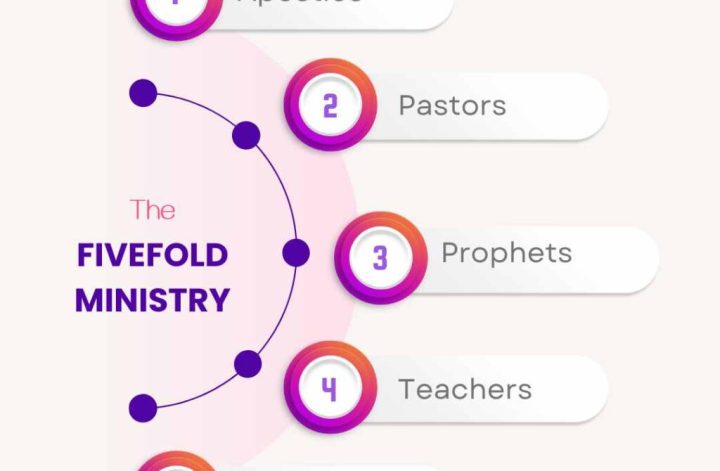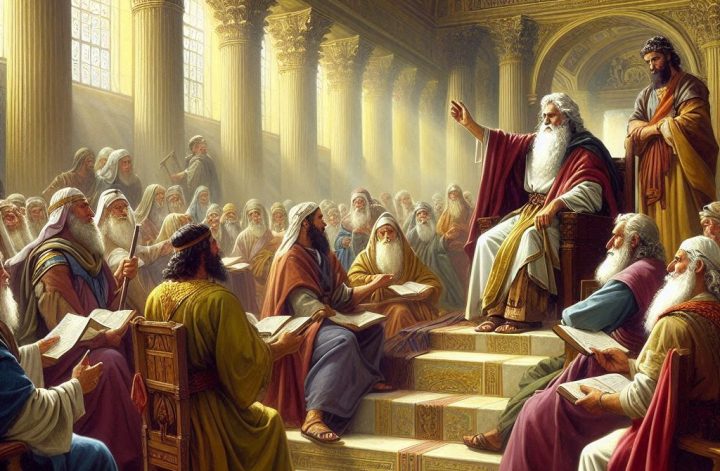Defining the Fivefold Ministry Gifts
The phrase “Fivefold ministry gifts” is a common term in charismatic circles, referring to the specific person-gifts the Spirit gives for the building of the Church. The gifts are apostle, prophet, pastor, evangelist, and teacher. Like most things humans touch, people have historically sought to place these gifts in hierarchical orders, with “Apostle” always coming out on top. Christians have also taken on these labels as pre-nominal titles. For example, Apostle Ade and Pastor Chike. Interestingly, to my knowledge, people have not used “teacher” as a pre-nominal title, unlike all others. I guess that “teacher” is at the very bottom of the ladder.
In our church meetings, we discuss these gifts as if we have a good understanding of what they are. For example, the Baker Encyclopedia of the Bible says the following concerning an evangelist:
“The meaning of the term indicates that the task of such a person is to function as a spokesperson for the church in proclaiming the gospel to the world. An evangelist is similar to an apostle in function, except that being an apostle involved a personal relationship to Jesus during his earthly ministry (Acts 1:21, 22).”
It is the view provided to most of us in the church. The evangelist goes out to the streets to preach the gospel of Jesus. The authors of the quote above seem to affirm that nobody can be an apostle today. As we shall see, this simple narrative about the gifts and their differences is quite deficient based on biblical data. Let us con
Who is an Evangelist?
Consider the following:
2 Timothy 4:1-5 ESV
[1] I charge you in the presence of God and of Christ Jesus, who is to judge the living and the dead, and by his appearing and his kingdom: [2] preach the word; be ready in season and out of season; reprove, rebuke, and exhort, with complete patience and teaching. [3] For the time is coming when people will not endure sound teaching, but having itching ears they will accumulate for themselves teachers to suit their own passions, [4] and will turn away from listening to the truth and wander off into myths. [5] As for you, always be sober-minded, endure suffering, do the work of an evangelist, fulfill your ministry.
Paul, nearing the end of his life and ministry, charges the much younger Timothy with preaching, reproving, rebuking, exhorting, and teaching in the context of a church. He emphasizes his point by reminding Timothy to “do the work of an evangelist,” the ministry gift God has given him. So, whatever it means to be an evangelist, in Timothy’s case anyway, includes all the things Paul says above—in a local church, not on the streets. Evangelist Timothy was to teach, exhort, and rebuke believers, not unbelievers, to ensure the people stay on the narrow path. In other words, Timothy was a teacher, a pastor, and more. In his case, an evangelist was also a teacher and a pastor.
The term “evangelist” actually only occurs two other times in the Bible:
Acts 21:8 ESV
On the next day we departed and came to Caesarea, and we entered the house of Philip the evangelist, who was one of the seven, and stayed with him.
This was the same Philip who took the gospel message to Samaria following the persecution against the Jerusalem church in Acts 8. Indeed, this story may have overly influenced our understanding of “evangelist” since Philip took to the streets to deliver the word. But going to the streets with a message was not unique to Philip. That was essentially what the Apostles did in Jerusalem and what Paul would do in the Gentile world. Hence, we may not conclude that an evangelist is the ministry gift that goes to the streets with the word. The earlier quote from the Baker Encyclopedia claims that what separates an apostle from an evangelist is a personal relationship with Jesus during his earthly ministry. But this idea assumes that Philip was not there from the beginning. Besides, as we shall soon see, Paul does not meet this requirement. Yet, he is arguably the best-known apostle of Jesus.
Here is the second occurrence of “evangelist”:
Ephesians 4:11 ESV
And he gave the apostles, the prophets, the evangelists, the shepherds and teachers,
This is the famous passage about ministry gifts, where Paul links the ancient prophecy of God conquering Bashan and Hades to Jesus’s giving of ministry gifts. For understanding who an evangelist is, only two of these occurrences are informative, and the Ephesians passage is not one of them. If we want to know who the New Testament identifies as an evangelist, we have only the 2 Timothy and Acts passages—and these texts should prompt us to reconsider the ubiquitous but unsubstantiated understanding of the “office” of an evangelist.
We can make a similar argument about all the other gifts. First, it may be helpful to note that Paul grammatically links “pastor” and “teacher” in Ephesians 4:11. It is as though a pastor is also a teacher—or, at the very least, expected to be capable of teaching.
An important point is that the move to blur the distinctiveness of these gifts actually began in the New Testament itself. Consider the “Apostle” gift. After Judas fatally malfunctioned, there was a need to replace him. Peter stipulates the following conditions:
Acts 1:21-22 ESV
[21] So one of the men who have accompanied us during all the time that the Lord Jesus went in and out among us, [22] beginning from the baptism of John until the day when he was taken up from us—one of these men must become with us a witness to his resurrection.”
This petrine condition is reasonable. Peter might have wanted to ensure that the new Apostle would have the same intimate knowledge of the ministry as the other Eleven. Whatever the case, Paul does not meet these conditions – yet, he is one of the best-known apostles of Jesus. This may be part of the reason some troublemakers in Corinth questioned Paul’s Apostleship. Also, notice that in defending his Apostleship, Paul, by implication, affirms only a part of the conditions Peter laid down:
1 Corinthians 9:1-2 ESV
[1] Am I not free? Am I not an apostle? Have I not seen Jesus our Lord? Are not you my workmanship in the Lord?
Whereas Peter said a condition for Judas’ replacement was to have been part of the ministry since the days of John the Baptizer until Jesus’ ascension, Paul merely says he has seen the Lord, most likely referring to the Damascus Road experience. So, we see within the New Testament itself the softening of the conditions for apostleship. The relevant point here is that while the apostles were foundational to the birthing of the Church of Jesus, the first Apostles were also evangelists and teachers. Paul “evangelized” the entire Roman Empire, and he also pastored churches, sometimes for periods of about two years at a time.
Here is another noteworthy point. Paul writes:
2 Corinthians 12:12 ESV
The signs of a true apostle were performed among you with utmost patience, with signs and wonders and mighty works.
Paul does not clarify what the “signs of a true apostle” are, and different Christian traditions have parsed this text in various ways. It is fair to say that many Charismatic churches think “wonders and mighty works” have something to do with it. But if that is the case, the Evangelist Philip would qualify:
Acts 8:5-7 ESV
[5] Philip went down to the city of Samaria and proclaimed to them the Christ. [6] And the crowds with one accord paid attention to what was being said by Philip, when they heard him and saw the signs that he did. [7] For unclean spirits, crying out with a loud voice, came out of many who had them, and many who were paralyzed or lame were healed.
Philip would seem to have fulfilled “the signs of a true apostle,” though he is not addressed as an apostle.
What about prophets?
Let us now briefly discuss prophets. The text of Acts 13:1 can be read in two ways, depending on how one punctuates it:
Acts 13:1 NRSV
[1] Now in the church at Antioch there were prophets and teachers: Barnabas, Simeon who was called Niger, Lucius of Cyrene, Manaen a member of the court of Herod the ruler, and Saul.
Acts 13:1 ESV
[1] Now there were in the church at Antioch prophets and teachers, Barnabas, Simeon who was called Niger, Lucius of Cyrene, Manaen a lifelong friend of Herod the tetrarch, and Saul.
If we follow the NRSV, the text would imply that Saul (that is, Paul) was a teacher and/or a prophet and an apostle. (The term “apostle” literally means “the sent one.”) This is even more likely because Acts earlier says Paul begins to teach and persuade people that Jesus is Lord shortly after the Damascus Road experience. It is noteworthy that in this passage, nobody is prophesying or teaching. Everyone was “worshiping the Lord and fasting” when the Spirit said, “Set apart for me Barnabas and Saul for the work to which I have called them.” Everybody present, prophets and teachers, discerned the voice of the Spirit and acted accordingly. The prophets did not have a special privilege of hearing first from God and then passing on the divine message to non-prophets.
What does this all mean?
Here are some key takeaways. First, God is not restricted by titles. If he wanted a teacher to function as an apostle, he did it without seeking permission. Second, the ministry gifts seem to be functions rather than fixed offices. There was a fluidity of spiritual gifting as God saw fit. Third, we really need to stop the puerile acts of ranking these gifts. Texts like Ephesians 2:20, which we have addressed elsewhere, likely contribute to the common idea that some gifts are more valuable than others; I do not think so. Fourth, we seem to have lost sight of the central point in our modern church practices. All the gifts are needed for the edification of each local assembly. The one-superstar model of churching is not the original vision. We do not need a pastor-led or prophet-led church. What the early churches practised was a plurality of gifts leading each assembly.
Finally, I am not rigidly opposed to the continued use of the terms in the traditional sense. If you prefer, you can continue to think of apostles as the “sent ones,” provided you recognize that the other gifts are sent as well; the Spirit specifically sent evangelist Philip to the Ethiopian Eunuch. You may also think of prophets as human intermediaries and conveyors of divine messages, so long as you realize that that is precisely what the other four gifts are, too. These gifts are not titles, but functions believers do. If anyone needs a title, God has already given us one: brothers and sisters – and in the ancient world of first-century Rome, few titles rival what these terms conveyed.
Work Cited
Elwell, Walter A., and Barry J. Beitzel. 1988. “Evangelist.” In Baker Encyclopedia of the Bible, 1:730. Grand Rapids, MI: Baker Book House.



